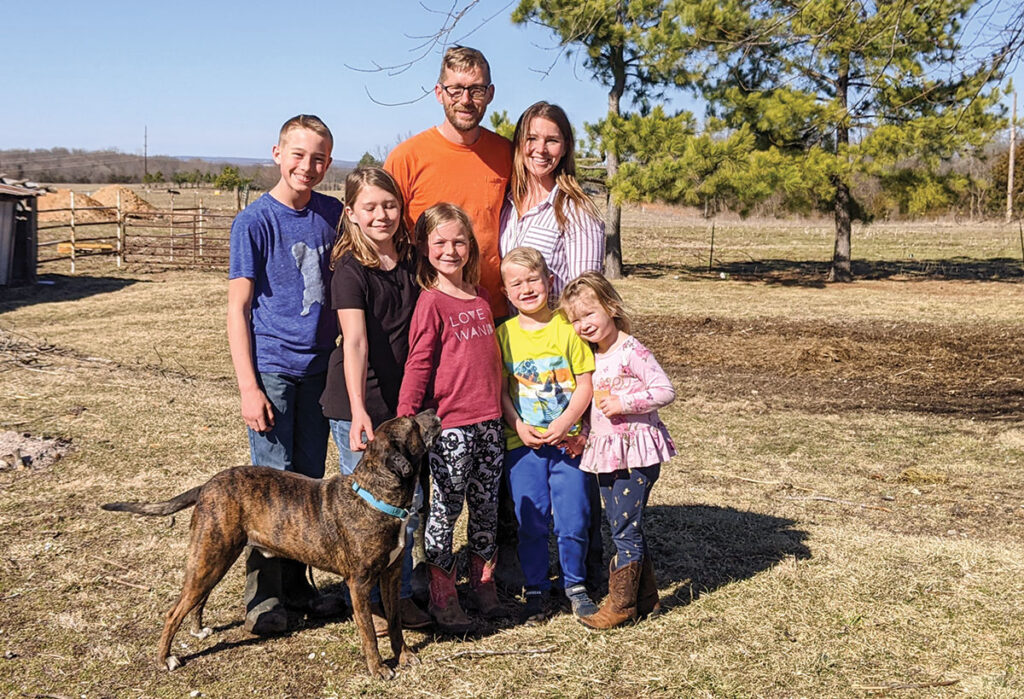
After years of “city life,” Austin and Rebekah Lebahn are back on the family farm
MANSFIELD, MO. – When Austin Lebahn dated his girlfriend during college, she visited him as he milked cows for his grandfather in Mansfield, Mo.
While he may have foreseen marrying Rebekah, little did he know they would end up moving onto that same farm with their five children and make it their own.
“I’d love to move my kids out here. I grew up on a farm,” Austin said of Lebahn Dairy, years later and living in the nearby city of Rogersville, Mo.
In 2018, he did not pass on the opportunity of his grandparent’s sale of the property. Kenneth and Delores Lebahn purchased the dairy farm in 1978 and retired from running it in 2008.
Austin surprised them with his interest in the family land and bought it together with his father Tim. The father and son already ran a heating and cooling business in the same town of Mansfield.
“My parents would go to work and make me walk up the fence row to meet Grandpa in the barn,” Austin recalled. “He would tie my tie before school.”
Austin lived in a house on the farm property with his parents, until his family moved when he was 6 years old.
“We’ve been converting it into a beef operation,” Austin said of the transformation they made on the farm. They began with selling their cattle to the sale barn, but have had more success with going straight to the butcher, where their customers purchase preordered whole or half beef. Austin said they call it, “a farm-to-family beef operation.”
They have 80 head of Angus and Angus/Hereford cross cattle
“Her [Rebekah’s] grandpa was the one that got me into the Hereford,” Austin said “I knew Angus was a good beef cow, but a Hereford bull will make a small calf, which makes it easy calving for the mom. The Hereford side of them makes them grow faster. They’ll go from 75 pounds birth weight to about 150 pounds in about two weeks.”
“My grandpa helped us find the right bull to breed, provided hay and networked tons of connections to help us get started,” said Rebekah of her family, also farmers.
Although she was born and raised as a city girl in Springfield, her grandparents, Kenneth and Alice Highfill, ran a beef operation in Humansville, Mo. The first time the Lebahns worked cattle, it was with the experienced, hands-on assistance of her grandparents, who were in their early 80s at the time.
Their cattle are raised on grass and grain-finished with Cattle Charge. For supplements they provide a mineral block. When they’re calving they get a protein tub.
“It gives them a little bit of extra minerals, extra protein. It helps them along in the calving season,” Austin said.
“Last year we did the most we have ever done, which was 250 at a time. We sold out within two weeks. even after that, people continuously asked.”
— Rebekah Lebahn
In making the transition from a 1,200-square-foot suburban house to a 330-acre farm, Rebekah admired how quickly and how well the children adapted. They also switched from public school to home school. The whole family really began learning together in 2018.
”We did meat chickens our first year on the farm, for ourselves. We had the land and wanted to be more self-sustaining,” Rebekah said. Through word of mouth, others found out and asked to purchase their poultry and demand has taken off.
“Last year we did the most we have ever done, which was 250 at a time,” she said. “We sold out within two weeks. Even after that, people continuously asked.”
They initially thought people wanted dual purpose, heritage birds, but the meat ratio on the bird was very dissatisfying, Rebekah said. They switched back to Cornish-cross, which are bred for larger breast and legs and reach 6 to 7 pounds in eight to nine weeks. Day-old chicks come from from Cackle Hatchery in Lebanon, Mo. Once they are ready to pasture, they go in a chicken tractor built by Austin and are moved to different plots daily to get fresh grubs and grass. They also receive an 18-percent grower grain mix, and. Electrolytes and apple cider vinegar in their water
Chicken butchering time, places demand on the entire family, in three cycles a year. They butcher, defeather, vacuum seal, label and freeze the chickens for sale. This year they are taking orders ahead of time. While the farm helps feed the family of seven with beef, eggs and poultry, there is a pause in cooking and eating chicken around butchering time.
“The last thing you want to do after butchering 250 chickens is to come in and cook dinner. So you come in to a roast or something as far away from chicken as possible,” Rebekah said.
The Lebahn children are third-generation farmers.
“My son wakes up every morning without complaint, in zero degree temperatures and goes and feeds a bale,” Rebekah said of their eldest, Tohbee, 13. He also rakes and bales hay in the summertime. Thatcher, 6, and Temperance, 9, are their chicken gatherers during butchering.”
Tinsley, 10, and Talia, 4, also help with the many chores.
Austin’s maternal grandmother, Gladys Levan, lives in another house on the property, one he lived in as a little boy. Their children follow in their father’s footsteps, along the same fence.
Rebekah’s grandmother, Alice Highfill told the couple to do everything they could together on the farm. They follow that advice.
“I’ve learned that it’s better to accomplish things side by side, rather than separated,” Rebekah said. “It keeps us close, eyes set on the same task at hand, and keeps us working hard together to achieve our daily goals.”







